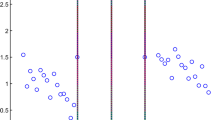Abstract
Although SVM have shown potential and promising performance in classification, they have been limited by speed particularly when the training data set is large. In this paper, we propose an algorithm called the fast SVM classification algorithm based on Karush-Kuhn-Tucker (KKT) conditions. In this algorithm, we remove points that are independent of support vectors firstly in the training process, and then decompose the remaining points into blocks to accelerate the next training. From the theoretical analysis, this algorithm can remarkably reduce the computation complexity and accelerate SVM training. And experiments on both artificial and real datasets demonstrate the efficiency of this algorithm.
Access this chapter
Tax calculation will be finalised at checkout
Purchases are for personal use only
Preview
Unable to display preview. Download preview PDF.
Similar content being viewed by others
References
Vapnik, V.N.: The Nature of Statistical Learning Theory. Springer, Heidelberg (1995)
Boley, D., Cao, D.: Training support vector machine using adaptive clustering. In: Proceedings of the SIAM International Conference on Data Mining, Lake Buena Vista, FL, USA, pp. 126–137 (2004)
Joachims, T.: Making large-scale support vector machine learning practical. In: Smola, A.J., Scholkopf, B., Burges, C. (eds.) Advances in Kernel Methods: Support Vector Machines. MIT Press, Cambridge (1998)
Platt, J.: Fast training of support vector machines using sequential minimal optimization. In: Smola, A.J., et al. (eds.) Advances in Kernel Methods: Support Vector Machines. MIT Press, Cambridge (1998)
Wang, D., Yeung, D.S., Eric, C.C.T.: Sample Reduction for SVM via Data Structure Analysis. In: IEEE International Conference on In System of Systems Engineering, pp. 1–6 (2007)
Naiyang, D., Yingjie, T.: The new data mining method–Support Vector Machine. Science Press, Beijing (2004)
Lin, K.-M., Lin, C.-J.: A study on reduced support vector machines. IEEE Transactions on Neural Networks (2003) (to appear)
Yeung, D., Wang, D.-F., Ng, W., Tsang, E., Wang, X.-Z.: Structured large margin machines: sensitive to data distribution. Machine Learning 68, 171–200 (2007)
Wen-hua, Z., Jian, M.: An Incremental Learning Algorithm for Support Vector Machine and its Application. Computer Integrated Manufacturing Systems, Special Magazine 9, 144–148 (2001)
Salvador, S., Chan, P.: Determining the number of clusters/segments in hierarchical clustering/segmentation algorithms. In: Proceedings of the 16th IEEE international conference on tools with AI, pp. 576–584 (2004)
Author information
Authors and Affiliations
Editor information
Editors and Affiliations
Rights and permissions
Copyright information
© 2009 Springer-Verlag Berlin Heidelberg
About this paper
Cite this paper
Zhang, Y., Wang, X., Zhai, J. (2009). A Fast Support Vector Machine Classification Algorithm Based on Karush-Kuhn-Tucker Conditions. In: Sakai, H., Chakraborty, M.K., Hassanien, A.E., Ślęzak, D., Zhu, W. (eds) Rough Sets, Fuzzy Sets, Data Mining and Granular Computing. RSFDGrC 2009. Lecture Notes in Computer Science(), vol 5908. Springer, Berlin, Heidelberg. https://doi.org/10.1007/978-3-642-10646-0_46
Download citation
DOI: https://doi.org/10.1007/978-3-642-10646-0_46
Publisher Name: Springer, Berlin, Heidelberg
Print ISBN: 978-3-642-10645-3
Online ISBN: 978-3-642-10646-0
eBook Packages: Computer ScienceComputer Science (R0)




